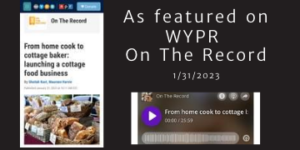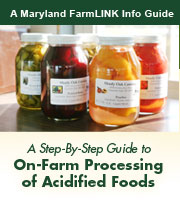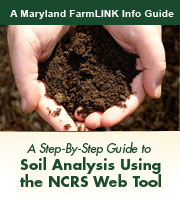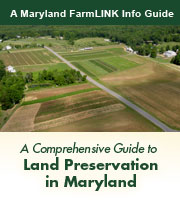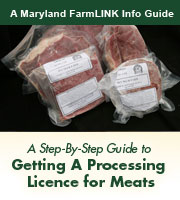SMADC Workshops & Tutorials
COTTAGE FOOD BUSINESS WORKSHOP RESOURCES
updated March 8, 2024
Overview: “A cottage food product is a non-potentially hazardous food that is sold in Maryland directly to a consumer from a residence, at a farmers market, at a public event, by personal delivery, or by mail delivery; or directly to a retail food store. Cottage foods cannot be offered for sale through interstate commerce.” On this page you’ll find everything you need to know to operate a home-based Cottage Food Business in Maryland – training video presentation slides, Cottage Food Business Guidelines, FAQ’s and more, developed for 2 comprehensive workshops about cottage foods presented by Maryland Department of Health (MDH) Office of Food Protection Facility and Process Review, in partnership with SMADC.
For questions about Cottage Foods please contact MDH staff at the New Cottage Foods and Retail Foods Line:
Email: mdh.foodplanreview@maryland.gov – please put Cottage Foods in the subject line OR call 410-767-8444.
2024 MDH Cottage Foods Business Workshop – Basics, Next Steps & Beyond
The MDH Cottage Foods Business Workshop, Basics, Next Steps & Beyond, builds on the information covered during the 2023 Virtual Cottage Food Workshop.
In this training, MDH Office of Food Protection staff provide an overview of Maryland’s Cottage Food law and regulations and familiarize you with the definition of a Cottage Food business, the types of products that can be sold, labeling requirements, and approved ways to sell products at a retail food store.
The presentation will also focus on the next steps of growing Cottage Food Business; food-specific scenarios help you work through the MDH Cottage Food Decision Tools and clarify when a food license is required. Also, you will learn how to access the available resources for food businesses.
- Workshop Video Recording – Now available for viewing (3/8/24)
- View workshop presentation slides/handouts
2023 Virtual Cottage Food Workshop
- Workshop Video Recording – MDH Plan Review Specialists guide you through an overview of Maryland’s Cottage Food law and regulations. You’ll become familiar with the definition of a Cottage Food Business and the types of products that can be sold, Cottage Food labeling requirements, how to request a Unique Identification Number (used instead of your business address), and how to sell your products at a Retail Food store. The presentation also explores the next steps for growing your Cottage Food Business.
- Download workshop presentation slides/handouts
- Post presentation Q & A – How much did you learn? Test your knowledge and keep the answers handy for future reference.
- More FAQ’s – MDH staff reviewed all the questions asked during February’s virtual Cottage Foods presentation. Find your answer here.
QUICK LINKS TO HELPFUL INFORMATION
- What is a Cottage Food Business? Find comprehensive links, resources, labeling requirements, and answers to your questions on the MDH Cottage Food Business webpage.
- What types of products can be sold by a Maryland Cottage Food business? Guidance for allowable foods that may be produced and how and where you can sell them.
- Frostings and Icings – Learn why butter-based cream frostings, royal icing with meringue powder, and icings made with perishable ingredients are NOT allowed as cottage food products.
- SMADC Cottage Foods Testing Reimbursement Funding – Got a favorite moist bread or frosting recipe you think can comply with MDH standards? Certain foods can be tested by a laboratory to determine if they are allowable and can be sold as cottage foods. *SMADC will reimburse the cost of Certified Laboratory tests and/or process review validation up to $250 for testing services for up to 10 Southern Maryland farmers/producers, first come first served basis as funds are available.
The Cottage Food Workshop and resources are made possible by the Maryland Department of Health, Office of Food Protection, in partnership with SMADC, a Division of the Tri-County Council for Southern Maryland.
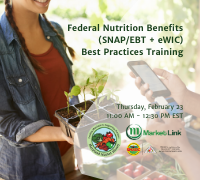
Federal Nutrition Benefits (SNAP/EBT + eWIC) Best Practices Training RESOURCES
Hosted virtually on February 23, 2023
In partnership with the National Association of Farmers Nutrition Programs’ MarketLink program, SMADC offered a Federal Nutrition Benefits (SNAP/EBT + eWIC) Best Practices Training to all Maryland farmers markets and direct marketing farmers on Thursday, February 23rd, from 11:00 a.m. to 12:30 p.m.
Implementation of federal nutrition benefits like the Supplemental Nutrition Assistance Program (SNAP/EBT) or the Special Supplemental Nutrition Program for Women, Infants, and Children (WIC) at Maryland farmers markets, farm stands, and CSAs is a crucial part of ensuring that locally-grown, fresh food is accessible to everyone in our communities. However, the logistics of offering these benefits at markets or by direct-marketing farmers can be challenging.
Please find resources and recordings from our discussion of best practices to help avoid and overcome these challenges.
Resources and slides
- Federal Nutrition Benefits Best Practices Training
Agenda and Maryland Resources - MarketLink Best Practices
Whitney Butler
Regional Representative, MarketLink - Introduction to e-Incentives
Kelley Koeppen
Farmers Market e-Incentive Coordinator, SMADC - Connecting to your Community
Cristina Berthelot
MMM External Relations Coordinator, SMADC - Recording Federal Nutrition Benefits SNAPEBT eWIC Best Practices Training 2023
Additional information and resources can be found at https://www.marylandmarketmoney.org/news/federal-nutrition-benefits-snapebt-ewic-best-practices-training
STEP-BY-STEP GUIDE TO ON-FARM PROCESSING OF ACIDIFIED FOODS
Do you want to sell your pickled beets and other acidified foods at a Farmers’ Market or to stores and restaurants? SMADC’s ‘Step-by-Step Guide’ has everything you need to get started, including sample forms and important contact information to help you to become a licensed, on-farm processor for acidified foods.
STEP-BY-STEP GUIDE TO SOIL ANALYSIS USING THE NCRS WEB TOOL
How good is the soil on your farm? (Or the land you are planning to purchase for your new farm?) This step-by-step guide explains how to use the National Resources Conservation Service (NCRS) website to get soil information about specific parcels of land.
New! G&F Regulatory Hub
Developing a Value-Added Agriculture (VAA) product can be a tremendous boon to your farm business. However, stepping into the realm of “processed” foods & beverages means that you must understand how to navigate the world of food safety regulations. There are federal, state and local regulations to comply with and these regulations change frequently. In fact, farmers and food producers make it challenging for regulators to keep up with their innovations!
Grow & Fortify created a regulatory hub to help you better understand the various regulations, and connect you with the right people to help you.
Contact SMADC
Phone: (240) 528-8850
Email: info@smadc.com

Susan McQuilkin
Marketing Executive


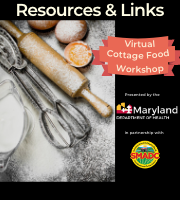 (
(